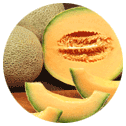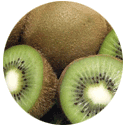GLOSSARY TERMS - 'M'
 Fruits in Mediterranean category are not very hardy to extreme cold, as the preceding temperate fruits are, yet tolerate some frost and can have a modest chilling requirement. Notable among these are natives of the Mediterranean Fruits.
Fruits in Mediterranean category are not very hardy to extreme cold, as the preceding temperate fruits are, yet tolerate some frost and can have a modest chilling requirement. Notable among these are natives of the Mediterranean Fruits.
 A tropical Asian evergreen tree (Mangifera indica) cultivated for edible fruit. The ovoid fruit of this tree that having a smooth rind, sweet juicy flesh, and a flat one-seeded stone. It is eaten ripe and pickled when green.
A tropical Asian evergreen tree (Mangifera indica) cultivated for edible fruit. The ovoid fruit of this tree that having a smooth rind, sweet juicy flesh, and a flat one-seeded stone. It is eaten ripe and pickled when green.
![]() A fruit, native to East India and Asia that has a dark red rind and a delicious milky juice. Inside, this fruit typically has 4 to 6 sections containing meat that could be easily scooped out with a spoon to be eaten while the seeds are discarded. To prepare, either slice off the top stem to scoop out the meat and cut the fruit in half, removing the seeds and scoop out the flesh. The fruit has a slightly tart but very sweet and delicious tasting meat that could be served as a snack or added to fruit salads.
A fruit, native to East India and Asia that has a dark red rind and a delicious milky juice. Inside, this fruit typically has 4 to 6 sections containing meat that could be easily scooped out with a spoon to be eaten while the seeds are discarded. To prepare, either slice off the top stem to scoop out the meat and cut the fruit in half, removing the seeds and scoop out the flesh. The fruit has a slightly tart but very sweet and delicious tasting meat that could be served as a snack or added to fruit salads.
 Mesocarp in a botanical term for the succulent and fleshy middle layer of the pericarp of drupaceous fruit, between the Exocarp and very endocarp; it is usually the part of the fruit, which is eaten. The term may also refer to any fruit which is fleshy throughout.
Mesocarp in a botanical term for the succulent and fleshy middle layer of the pericarp of drupaceous fruit, between the Exocarp and very endocarp; it is usually the part of the fruit, which is eaten. The term may also refer to any fruit which is fleshy throughout.
 Mulberry (Morus) is a genus of 10-15 species of deciduous trees native to warm temperate and also subtropical regions of Asia, Africa and North America, with the majority of the species native to Asia. The closely related genus Broussonetia is also frequently known as mulberry, notably the Paper Mulberry Broussonetia papyri era.
Mulberry (Morus) is a genus of 10-15 species of deciduous trees native to warm temperate and also subtropical regions of Asia, Africa and North America, with the majority of the species native to Asia. The closely related genus Broussonetia is also frequently known as mulberry, notably the Paper Mulberry Broussonetia papyri era.
 A multiple fruit is formed from a cluster of flowers known an inflorescence. Each flower does generate a fruit, but these mature into a single mass. Good examples are mulberry, pineapple, and breadfruit.
A multiple fruit is formed from a cluster of flowers known an inflorescence. Each flower does generate a fruit, but these mature into a single mass. Good examples are mulberry, pineapple, and breadfruit.
 Melonís nutritional value is 15.00 mg of calcium; 25.00 mg of phosphorus; 0.5 mg iron; 34 mg vitamin C, 640 mg IU Vitamin A; and 0.03 mg of Vitamin B1. The melon has an excellent diuretic properties that can cure kidney disease and extreme eczema disease and acute. When combined with lemon, it can crush the uric acid diseases. So you'll want to eat the melon on a regular basis at least once a day in the morning.
Melonís nutritional value is 15.00 mg of calcium; 25.00 mg of phosphorus; 0.5 mg iron; 34 mg vitamin C, 640 mg IU Vitamin A; and 0.03 mg of Vitamin B1. The melon has an excellent diuretic properties that can cure kidney disease and extreme eczema disease and acute. When combined with lemon, it can crush the uric acid diseases. So you'll want to eat the melon on a regular basis at least once a day in the morning.















